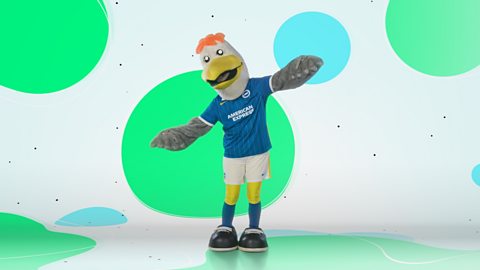Naomi Wilkinson:
Ok, Super Movers, let's learn about some of the ways we can stay safe. Here we go.
There's so much fun to have each day we could go to the beach or out to play. We could go to the park or a swimming pool. We can stay at home or go to school. But there's one thing that we must be so we can play quite happily…
Safe.
That's how we like to be. Safe.
Ask for help that's safety. Safe.
Safe at home or the playground, safe. We're OK, we're safe and sound.
So who helps us stay safe? It could be your family, teachers, doctors or nurses, police officers, or firefighters.
It can be a grown up that you trust, but I wonder, how can we keep our bodies safe in different places? Let's find out. Where can we go if we want to play a playground? That's the safer way with a soft landing so if we fall, it won't hurt so much or hurt at all.
Off to the beach. What should you do? You should stay near the grown up looking after you. That amazing, great, big, powerful sea is dangerous for you and me. So there's one thing that we must be so we can play quite happily. Safe.
That's how we like to be.
Ask for help that's safety. Safe. Safe at home or the playground. Safe. We're OK, we're safe and sound.
Ok, so this is a big one. How do we stay safe near those dangerous roads? Well, first, we stay very close to our grown up and then we stop, look and listen. Oh, there's a car. Let's wait. Let's try again. Stop. Look, and listen. Are there any cars? No, let's cross.
When you're outside walking near a road, you need a grown up near and the green cross code. Let's all live in safety so we can live quite happily. Safe.
That's how we like to be. Safe.
Ask for help. That's safety. Safe. Safe at home or the playground. Safe.
We're OK, we're safe and sound.
Naomi Wilkinson performs this uplifting Super Mood Movers song about being happy and staying safe.
After viewing, singing and dancing along, your class could try some of these activities to further explore their learning:
Activities
- Puppet making: Pupils could make finger puppets (from tubes of card) of people in their lives who help them stay safe. The figures might include: a park ranger, nurse, doctor, lollipop man or lady, dinner supervisor, classroom helper, teacher, parent, brother or sister, friend, police officer, fire-fighter or swimming-pool lifeguard.
- Puppet shows: Ask pupils to introduce their puppets. You could demonstrate: 'I'm Andy the street cleaner. I help keep kids safe by clearing up broken glass that might hurt them.' Pairs of pupils could take turns to introduce their puppets to each other.
- Safe places: Children could explore the playground (or perhaps a nearby park) and draw any features they can spot that have been put there to keep people safe. They might notice: railings and barriers around school entrances, zig-zag road markings and street signs outside of the school; street lamps; speed cameras; slow-close doors to avoid trapped fingers and soft-landing areas under climbing frames.
- Road safety videos: The class could watch videos made by the UK government's Think! road safety campaign at or by Road Safety Scotland roadsafety.scot or by Road Safety Wales or by Northern Ireland's
- Crossing the road: Children could work together to make a model of a road, using a construction toy or old cereal boxes. They could take turns to model the safe way to cross the road, using toy figures and cars. Ask: 'Do you think children at infant school should cross the road on their own?' Establish they should only cross the road when a grown-up is looking after them.
- Safe sentences: Ask - 'What can you do to keep yourself safe?' Give pupils a sentence to complete. 'To stay safe, I will …' The children could share their ideas with the class, such as: 'To stay safe, I will stay with a grown-up when I am out.'; 'To stay safe, I will hold my mum's hand when I cross the road.' or 'To stay safe from germs, I will wash my hands before I eat my dinner.' Children could copy out their safe sentences and illustrate them with drawings to make a classroom wall display.
- Who can help?: Ask - 'If you felt worried about something that made you feel unsafe, who could you go to for help?' Guide children to consider how family, friends and trusted adults can help to keep them safe. Let children know they can always ask a member of school staff for help if they need it, even for problems beyond school. Reassure the class with: 'It's OK to ask for help. Everyone needs somebody's help at some time.'
Learning aims or objectives
The Super Mood Movers song Staying Safe and these activity notes address the following learning objectives from the curriculum guidance of the four UK nations.
England, PHSE and RSE
From the PSHE Association programme of study:
- Health and Wellbeing:
- H29. to recognise risk in simple everyday situations and what action to take to minimise harm.
- H32. ways to keep safe in familiar and unfamiliar environments (e.g. beach, shopping centre, park, swimming pool, on the street) and how to cross the road safely.
- H33. about the people whose job it is to help keep us safe.
- R20. what to do if they feel unsafe or worried for themselves or others; who to ask for help.
From the RSE guidance:
- Being Safe:
- How to ask for advice or help for themselves or others.
- Where to get advice e.g. family, school and/or other sources.
Northern Ireland, PD&MU
From the Northern Ireland curriculum for Personal Development and Mutual Understanding:
- Safety: Foundation Stage (Strand 1):
- How to keep safe in familiar & unfamiliar environments.
- Explore appropriate personal safety strategies.
- Identify situations that are safe and those where personal safety may be at risk.
- Begin to realise the importance of road safety.
- Key Stage 1 (Strand 1):
- Strategies and skills for keeping safe.
- Know what to do or whom to seek help from when feeling unsafe.
- Explore the rules for and ways of keeping safe on the roads, cooperating with adults involved in road safety.
- Know about the potential dangers and threats in the home and environment.
- Develop simple safety rules and strategies to protect themselves from potentially dangerous situations.
Scotland, PSE
From the Education Scotland Personal and Social Education benchmarks:
- Health and wellbeing (Early Level):
- I understand … how to keep myself safe (HWB 0-38a).
- I can show ways of getting help in unsafe situations and emergencies (HWB 0-42a).
- Health and wellbeing (First Level):
- I am becoming aware of how choices I make can affect my health and wellbeing (HWB1-38a).
- I know how to react in unsafe situations and emergencies (HWB1-42a).
From the Curriculum for Excellence Health and Wellbeing Experiences and Outcomes:
- Mental and emotional wellbeing:
- I understand that there are people I can talk to and that there are a number of ways in which I can gain access to practical and emotional support to help me and others in a range of circumstances (HWB 0-03a / HWB 1-03a).
- Physical wellbeing:
- I am developing my understanding of the human body and can use this knowledge to maintain and improve my wellbeing and health (HWB 0-15a / HWB 1-15a).
- I am learning to assess and manage risk, to protect myself and others, and to reduce the potential for harm when possible (HWB 0-16a / HWB 1-16a).
- I know and can demonstrate how to travel safely (HWB 0-18a / HWB 1-18a).
- Food and health - Safe and hygienic practices:
- I am becoming aware of how cleanliness, hygiene and safety can affect health and wellbeing and I apply this knowledge in my everyday routines (HWB 0-33a / HWB 1-33a).
Wales, PSE
From the Personal and Social Education Framework for 7 to 19-year-olds in Wales:
- Health and emotional well-being:
- Take increasing responsibility for keeping the mind and body safe and healthy.
- The importance of personal safety; what to do or to whom to go when feeling unsafe.

More from Super Mood Movers:
Fit and well. video
Brighton & Hove Albion mascot Gully the Seagull performs this upbeat Super Mood Movers song about the importance of staying fit and well.

Taking care of our world. video
Pudsey and Karim Zeroual perform this larger-than-life Super Mood Movers song about the importance of taking care of the world around us.

Friends and family. video
Pudsey performs this toe-tapping Super Mood Movers song which offers a huge 'big up' to our friends and family.

Coping with feelings. video
Rhys Stephenson performs this touching Super Mood Movers song about different feelings.

Ways to learn and play. video
Rhys Stephenson performs this energetic Super Mood Movers song about learning through play.
